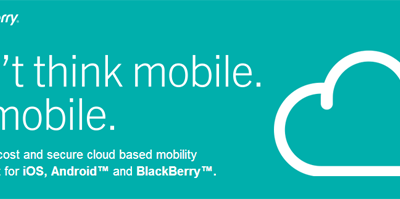iOS And Android Cloud Service From BlackBerry

It seems BlackBerry is not out, at least for now. Even though last month, on September 23, BlackBerry signed a letter of intent to be acquired for US$4.7 billion by a consortium led by Fairfax Financial, the Canadian telecommunication company announced today, at the Gartner Symposium in Orlando, Florida, plans for a cloud based service for managing users and apps across BlackBerry, iOS and Android.
The new cloud based service from BlackBerry is very ambitious as it tries to address the ‘bring your own device’ movement while also solving privacy issues and tech support, all for a very small price, “less than a cup of coffee a month” as BlackBerry says in the official statement. Here are all the feature of BlackBerry’s upcoming cloud service. This is what BlackBerry’s cloud service will offer, taken directly from the official announcement:
- Simple and fast deployment. No server hardware or software to install, just register and go.
- Administrators can easily manage and secure smartphones and tablets. The simple Web-based admin console will provide easy activation and deployment of BlackBerry, iOS and Android™ smartphones, app management, security policy configuration and compliance monitoring.
- Administrators can secure, deploy and manage apps. Administrators will be able to build a catalog of public apps from the App StoreSM, Google Play and the BlackBerry World storefront, and then view app distribution and usage for all users and devices.
- End-users can manage their own devices through the self-service console. End-users will be able to easily perform common management tasks such as setting up or changing device passwords and remote wipe and lock without relying on an administrator, giving them independence and saving on helpdesk calls.
It is completely understandable that after the buyout BlackBerry will invest in software and services, especially considering the company’s devices don’t rank in the top 5 OEM makers in the United States, according to comScore. Not only that, but even BlackBerry’s operating system decreased to four percent in the same market. This being the current status of the company, a focus on software and services can only be beneficial; as the company introduces new services and apps (such as the BlackBerry Messenger) on both Android and iOS, it may find a new market.
However, the company’s cross platform focus on messaging has had its share of failures, increasing pressure for the company to succeed in delivering a good product. As we already reported, BlackBerry promised to release the iOS and Android versions of the BlackBerry Messenger earlier this year, but that didn’t end well as the iOS app debuted but was then removed from the App Store.
At this point, BlackBerry is the underdog. As always, we will keep you up to date with news regarding BlackBerry’s upcoming cloud based service. In the meantime you can tell us if you would be interested in a cloud service from BlackBerry, by leaving a comment in the dedicated section below.











